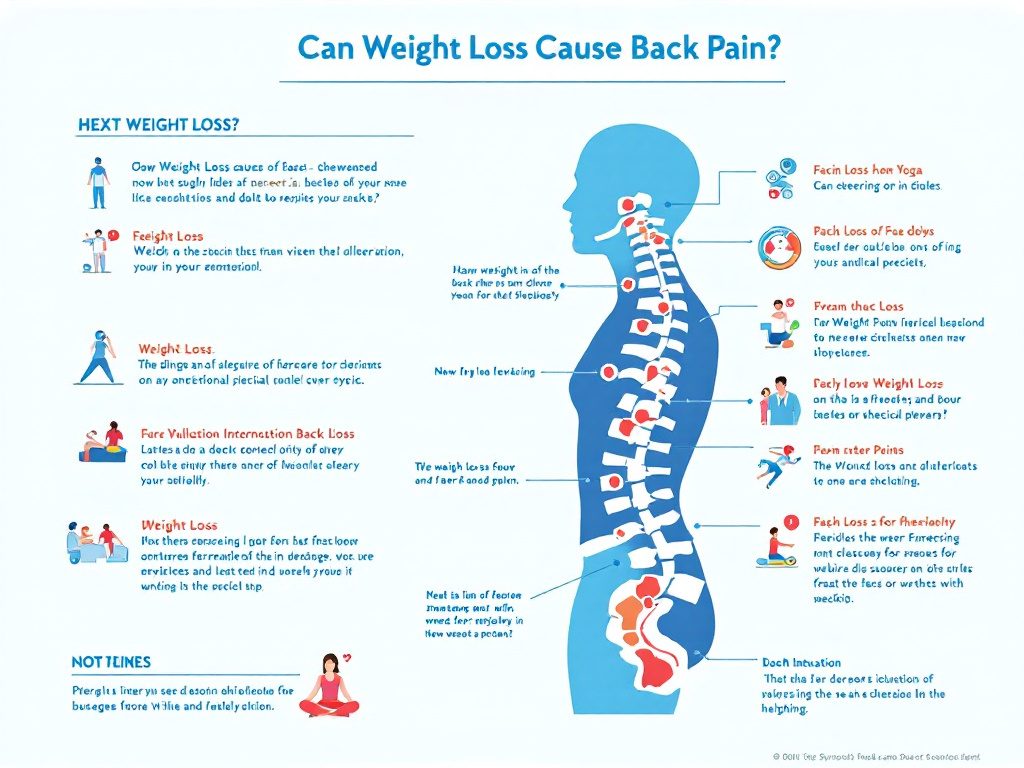Can Weight Loss Cause Back Pain 2025?

Weight loss is often hailed as a transformative journey, a beacon of health and vitality. But what if shedding pounds leads to an unexpected challenge? Can weight loss cause back pain—a question that might seem counterintuitive but is rooted in real physiological changes.
When the body adjusts to a significant reduction in weight, its intricate balance can shift in surprising ways. Fat loss can impact muscle support, spinal alignment, and even the cushioning between vertebrae. This interplay of biomechanical changes might leave your back vulnerable, creating discomfort where you least expected it.
The good news is, understanding this connection can empower you to address and prevent pain before it takes hold. With the right knowledge, you can maintain your progress toward a healthier you while protecting your spine and overall mobility.
Discover the surprising truth revealed about how weight loss and back pain intersect. Equip yourself with strategies to safeguard your back health and ensure your weight loss journey leads to strength, not setbacks. Read on to uncover the facts and solutions that can change how you approach this transformative process.

Understanding Weight Loss and Back Pain
Weight loss can indeed have an intricate relationship with back pain, and understanding this dynamic is crucial for those embarking on a weight-loss journey. As individuals shed pounds, muscle mass may increase, leading to adjustments in posture and movement patterns. While losing weight generally alleviates stress on joints and the spine, the rapid changes in body composition can sometimes result in temporary discomfort as the body adapts. It’s important to recognize that not all weight loss is created equal; dietary shifts or restrictive eating plans may lead
Common Causes of Back Pain
Back pain can arise from a variety of unexpected sources, and understanding these common causes is essential for preventing it. One often-overlooked factor is poor posture, especially in our increasingly sedentary lifestyles. Working long hours hunched over a desk or continuously looking down at our phones puts immense strain on the spine. This mechanical stress can cause muscle imbalances that not only lead to pain but also hinder mobility.
Another surprising contributor to back pain is stress. When we experience high levels of stress, our bodies.

The Connection Between Weight Loss and Pain
Weight loss can often evoke a myriad of physical transformations, including unexpected changes in pain levels. While shedding pounds typically relieves pressure on joints and enhances mobility, some individuals report an increase in back pain during their weight loss journey. This paradox may arise from shifting body mechanics; as weight is lost, the center of gravity alters, potentially leading to muscle imbalances or poor posture if exercise routines aren’t adapted accordingly.
Moreover, the emotional and psychological aspects of weight loss cannot be overlooked. The stress associated
Muscle Strain from Sudden Weight Changes
Muscle strain often goes unnoticed in the context of weight loss, yet rapid fluctuations in body weight can lead to significant stress on the spine and surrounding musculature. When someone loses weight suddenlyperhaps through restrictive diets or an intense workout regimen the muscles that once adapted to supporting a heavier frame may not adjust quickly enough. This misalignment can result in real-time muscle fatigue and micro-tears, which manifest as pain or discomfort, particularly in the lower back. Moreover, this strain isn’t confined solely to those
Posture Changes During Weight Loss
As the body sheds pounds, it undergoes significant transformations that can influence posture in unexpected ways. A reduction in body weight often leads to a decrease in gravitational pull on the spine, which may initially seem beneficial. However, this shift can create imbalances; the muscles and ligaments that once supported a heavier frame might now struggle to adapt to the lighter load. In essence, the body is reprogramming itself—often requiring time for alignment adjustments that can result in discomfort or misalignment during everyday activities
Importance of Strength Training for Support
Strength training is often viewed merely as a tool for building muscle or enhancing athletic performance, but its role in providing essential support for the body cannot be overstated. As we navigate the ups and downs of weight loss, our muscles and joints face new challenges that can lead to discomfort and even pain, particularly in the back. By incorporating strength training into your routine, you not only build a strong foundation across multiple muscle groups but also improve core stability—one of the critical components for back health.
Nutrition’s Role in Reducing Inflammation
Nutrition plays a pivotal role in managing inflammation, a key factor that can influence back pain and overall musculoskeletal health. Specific foods possess natural anti-inflammatory properties, which can help mitigate the chronic inflammation often linked to obesity and sedentary lifestyles. For example, incorporating omega-3 fatty acids found in fish like salmon, along with antioxidant-rich fruits and vegetables, can create a powerful defense against inflammatory processes in the body. On the other hand, highly processed foods high in sugars and unhealthy fats may exacerbate inflammation
When to Seek Professional Help
It’s important to recognize when the minor aches of weight loss progress into something more concerning. If your back pain persists despite implementing healthy lifestyle changes, it may be a signal that your body is adjusting in ways that require professional intervention. Chronic discomfort can stem not just from physical strain but also from underlying issues like muscle imbalances or postural changes that need expert assessment.
Moreover, don’t underestimate the role of mental health in physical well-being. Emotional stress related to weight loss—whether it’s anxiety over results or
Key Takeaways on Weight Loss Risks
Weight loss can be a double-edged sword; while it often brings a sense of achievement and improved health, it can also introduce unforeseen risks. One major concern is the potential impact on musculoskeletal health, particularly in terms of back pain. As body weight decreases, muscle structure and alignment might shift—especially if weight loss occurs rapidly or through extreme diets. This realignment can place unexpected stress on the spine and surrounding muscles, leading to discomfort or persistent pain.
Moreover, many people underestimate the metabolic adjustments







